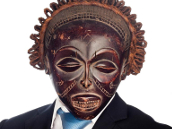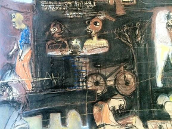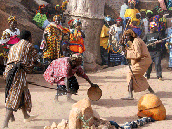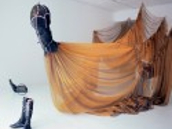Zondag 28 Februari 2016

Edson Chagas, Angola in Ocean of Images: New Photography 2015
New Photography, MoMA’s longstanding exhibition series of recent work in photography, returns this fall in an expanded, biannual format. On the occasion of its 30th anniversary, New Photography is expanding to 19 artists and artist collectives from 14 countries, and includes works made specifically for this exhibition. Coinciding with the opening of the exhibition, MoMA will also launch an online platform featuring selections from the archive of the New Photography series, including documents and images from the series' 30-year history. The artists included are: Edson Chagas (Angolan, b. 1977)

Tentoonstelling Joël Mpah Dooh (Kameroen)
Galerie 23 start het nieuwe jaar met een expositie van Joël Mpah Dooh (1956). Dooh woont en werkt in Douala, Kameroen, en studeerde aan de Conservatoire Municipal des Beaux- Arts in Amiens, Frankrijk. Hij is met name bekend om zijn schilderijen en multi- media werken. Ook werkt hij op doek, papier en verroeste, ijzeren platen waar hij aarde, verf, klei, hout en krijt op verwerkt. In deze tentoonstelling laat hij enkele tientallen kleine tekeningen zien, 3 enorme werken op papier en een enkel werk op metaal.

New exhibition: Scenes of Dogon life, photos by Wouter van Beek
The Dogon of Mali form one of the visual highlights of West Africa. With the spectacular setting of their villages against the Bandiagara cliff, their iconic mask performances and their ethnographic fame, they form a core attraction in West African culture tourism. But also Dogon daily life is well worth capturing on camera, as is shown in this photo exhibition by Wouter van Beek, the anthropologist who has worked in the Dogon area since 1979. Here the brilliance of Dogon ritual performances is complemented by the visual appeal of their everyday village life.

tentoonstelling: Nicholas Hlobo (Zuid-Afrika) - Imilonji Yembali (Melodies of History)
Eerste solotentoonstelling in NL. De installaties van Nicholas Hlobo (Kaapstad, 1975) zijn rijk aan kleuren, stoffen en borduursels. Ze doen denken aan de kleurrijke kleding van Afrikaanse vrouwen. Maar bij nadere beschouwing ontvouwt zich de tweede laag die refereert aan het gruwelijke en gewelddadige verleden van het Zuid-Afrika van de apartheid en post-apartheid. Een verleden waar voor een zwarte homoseksuele kunstenaar niet aan te ontkomen valt. De geboortegrond van Hlobo is onlosmakelijk verbonden met zijn drang om de geschiedenis en cultuur van zijn land via zijn werk wereldkundig te maken.



